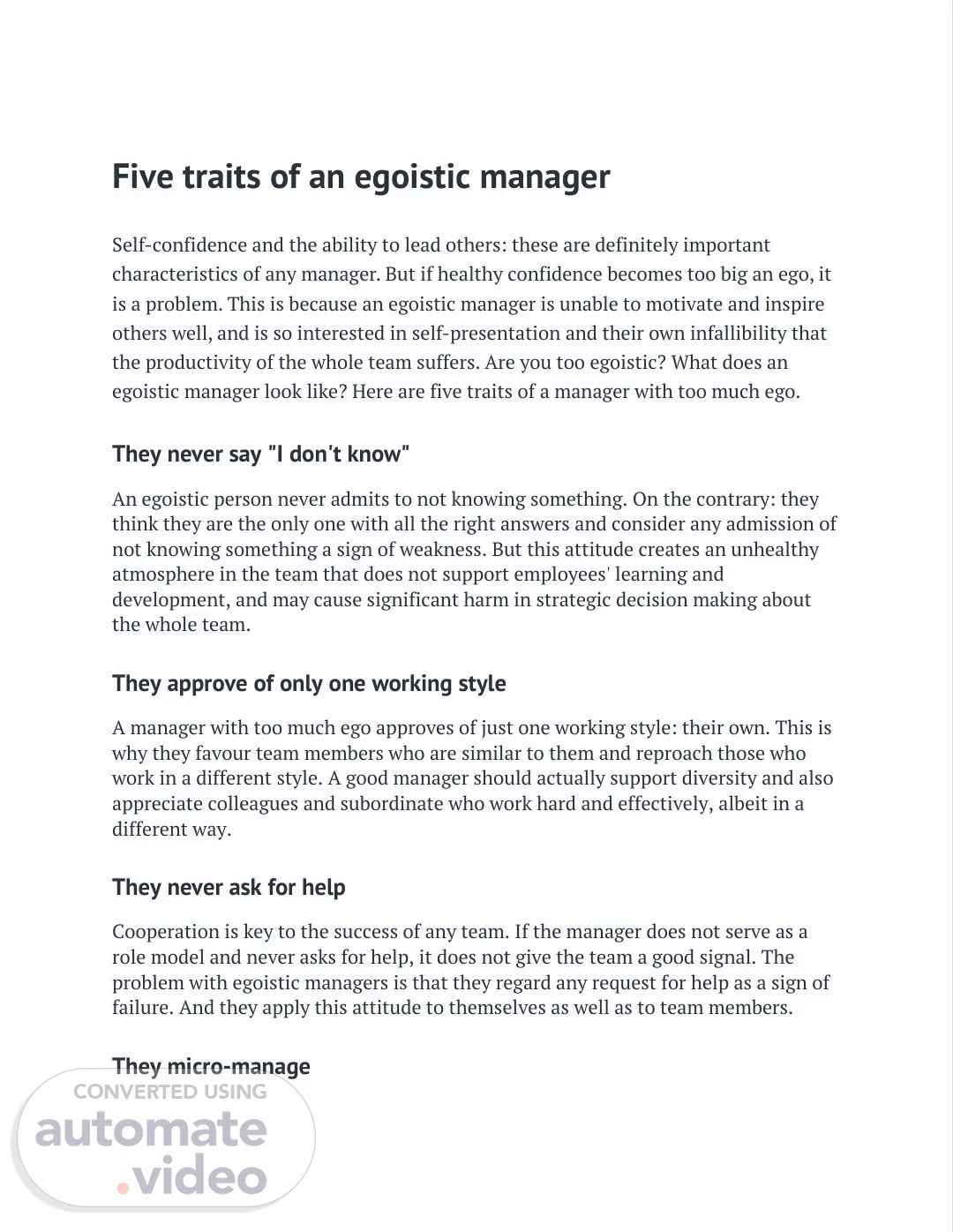Scene 1 (0s)
[Audio] When we discuss a manager with excessive ego, we refer to someone who has taken their natural self-confidence and ability to lead others to an extreme. Confidence and leadership skills are essential qualities for any manager, yet an overinflated ego can create issues. An egoistic manager struggles to motivate and inspire others effectively, prioritizing self-presentation and their own infallibility over the team's productivity. They tend to never admit to not knowing something, believing they possess all the correct answers. This attitude fosters an unhealthy team environment, stifling learning and development, and potentially harming strategic decision-making. They also prefer a single working style - their own - and praise team members who mirror them, while criticizing those who operate differently. Furthermore, they rarely seek help, perceiving requests for assistance as failures. Additionally, they frequently micromanage their team members, monitoring their every action and correcting each mistake. Essentially, an egoistic manager perceives themselves as superior to their team, rather than being part of it..
Scene 2 (1m 4s)
[Audio] An egoistic manager tends to micro-manage others, watching their team's every step and mentioning every single mistake. They do not allow employees sufficient space for their work, as they believe they are the only ones capable of achieving good results. This approach prevents them from being part of the team, instead placing themselves above it. An egoistic manager lacks inspirational and understanding qualities, providing only authoritative leadership. Consequently, the team's full potential remains unexploited. In contrast, a good manager is a leader who supports the team, even during challenging times, and is part of the team itself..
Scene 3 (1m 44s)
[Audio] Brilliance of your team members should take center stage. It's about guiding, not dictating; listening, not just talking. This often-misunderstood nature of leadership can make or break a leader's effectiveness. True leaders know when to put their egos aside, prioritizing the team's needs and fostering an environment that allows creativity, open communication, and teamwork to thrive. Remember, a leader's strength is measured not by their individual brilliance, but by the collective success of their team. The transition from individual contributor to leader requires a shift in perspective. Suddenly, the spotlight is not solely on you anymore. Instead, it shines on your team and their accomplishments. This transition is not always easy. The value you bring is no longer measured by the tasks you complete, but by the harmony you create among your team and the tune you guide them to play. Becoming a leader means shifting your focus from self to service. As an individual contributor, you concentrate on personal growth and success. But as a leader, your primary responsibility is the development and success of your team. It's not about showing how much you know or how well you can do the job. It's about empowering your team to do their best, facilitating their growth, and guiding them towards success. This transition also requires an adjustment in how you perceive success. As an individual contributor, success is typically measured by personal accomplishments. But as a leader, your triumphs are found in the achievements of your team. The more your team succeeds, the more you succeed. And that success is not just about hitting targets and deadlines. It also includes fostering a collaborative and inclusive environment where everyone feels valued, heard, and motivated to do their best. So, as you take the leap from individual contributor to leader, remember that your role has evolved. You're no longer just an expert in your field; you're a guide, a mentor, a cheerleader for your team. Your job is not just about doing; it's about enabling, empowering, and leading others to do..
Scene 4 (3m 49s)
[Audio] Effective leaders recognize that their ego is a liability, not an asset. It's a dangerous blind spot that leads to missed opportunities for improvement and growth. An inflated ego blinds a leader to their own mistakes, making them resistant to criticism or feedback. This refusal to acknowledge errors not only stunts personal growth but can also poison the well of trust within a team. Members might hesitate to share their views, stifling innovation and hindering effective collaboration. A leader's unchecked ego can foster an environment of intimidation and fear, making the workplace a battleground rather than a breeding ground for ideas and creativity. It's like an invisible barrier between the leader and the team, creating an unwelcoming climate of superiority rather than a nurturing environment of equality and respect. An egotistical leader also runs the risk of alienating their team members. When a leader constantly asserts their own superiority, it can lead to a disconnect, creating a chasm of misunderstanding and resentment within the team. People are less likely to follow a leader who seems to value their own achievements more than the collective success of the team. Effective leadership is built on trust, respect, and mutual growth, elements that wither away under the scorching heat of egotism. The ego might promise a glittering crown of personal achievement, but it often comes at the cost of sacrificing the harmony, collaboration, and shared success that mark truly effective leadership. A wise leader knows when to tame their ego, ensuring it doesn't morph into an enemy in their leadership journey..
Scene 5 (5m 26s)
[Audio] As we conclude our journey together, I am grateful for your attention and engagement throughout this presentation. Your willingness to explore the complexities of leadership and the importance of humility has been truly inspiring. May the lessons learned guide you on your own path towards effective leadership, where you empower others, celebrate diversity, and create a culture of collaboration and growth. Thank you again for joining me on this voyage of discovery. May your future endeavors be filled with wisdom, courage, and the collective light of your team shining bright..
